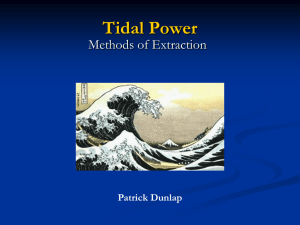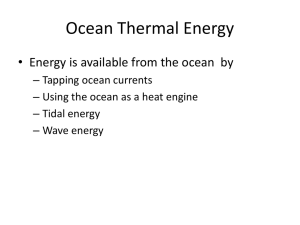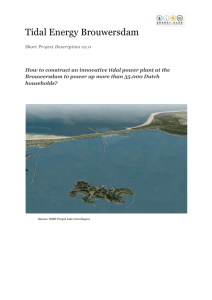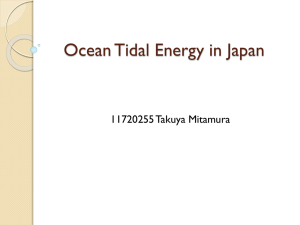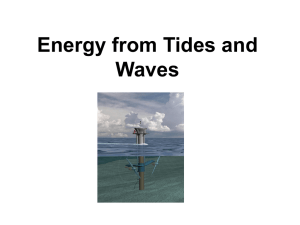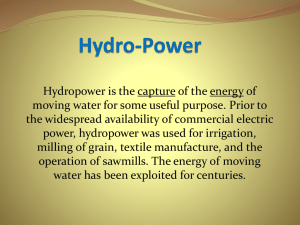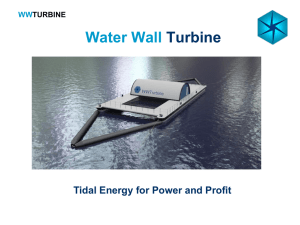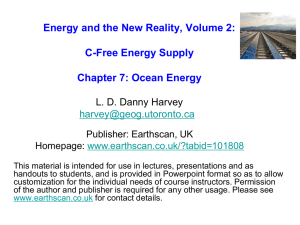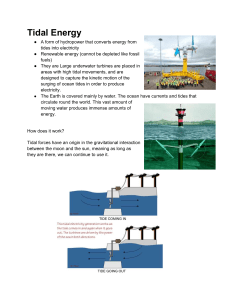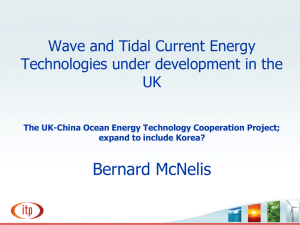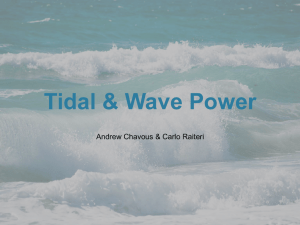Tidal and Wave Energy - Presentation
advertisement
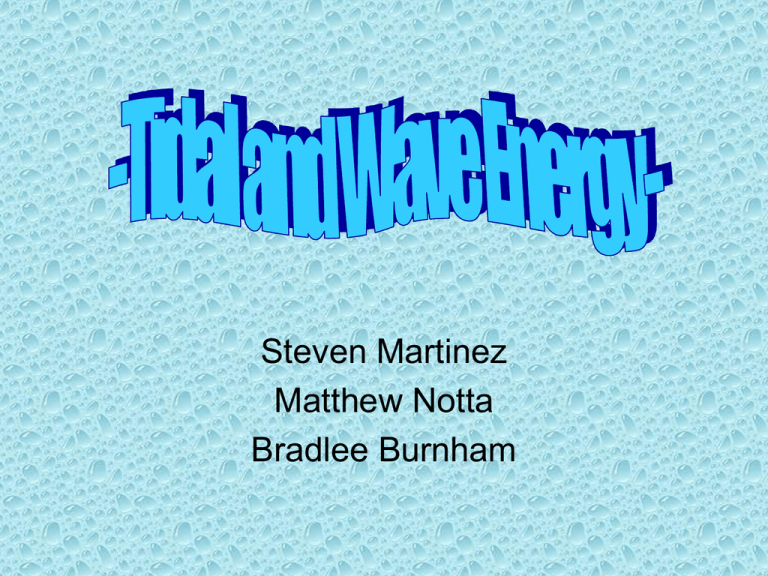
Steven Martinez Matthew Notta Bradlee Burnham -History of Tidal Energy• 787: simple technique of a waterwheel by the Spanish, French, and British • 1966: “La Rance” tidal power plant went in operation. • 2001: British Parliament states “the world can no longer neglect the massive potential of wave and tidal energy” • 2002-present: Large investments in research and prototypes spark proposals in Turkey, China, and United States; among others -History of Wave Energy• 1799: First patent of a device designed to use ocean waves to generate power • 1910: First oscillating water column was built by Bochaux-Praceique to power his house • 1940s: Yoshio Masuda experimented with many concepts of wave power • 2004: Wave power was delivered to an electrical grid for the first time -Tidal Stream Generators• Very close in concept to traditional windmills • Most popular prototype on the market • Prototype sites include Norway, England, and New York. – In 2007 8 prototype turbines where placed in the East River between Queens and Roosevelt Island. • It is the first major tidal power project in the USA • Powers 1/3 of a parking garage and a supermarket -SeaGen• World’s first large scale commercial tidal stream generator. • First one was installed in the Strangford Narrows (Ireland) • Generates 1.2MW between 18-20 hours a day • Blades span 16 meters in diameter •http://www.energysavers. gov/renewable_energy/ocean/index.cfm/mytopic=50009 -Barrage Tidal Power: Rance Power Station- • Located on Rance River, France • • • • • 750 meters long 24 Turbines Capacity of 240MW Annual output of 600GWh Supplies 0.012% of Frances power supply. • Opened 1966 •http://www.energysavers. gov/renewable_energy/ocean/index.cfm/mytopic=50009 -Calculations: Tidal Stream Generators- P = the power generated (in watts) ξ = the turbine efficiency ρ = the density of the water (seawater is 1025 kg/m³) A = the sweep area of the turbine (in m²) V = the velocity of the flow *Power equation is based on the kinetic energy of the moving water* -Calculation: Barrage Tidal Power- • E = energy • ρ = the density of the water (seawater is 1025 kg/m³) • A = horizontal area of the barrage basin • G = Gravity (9.81m/s2) • H = Vertical Tide Range * The potential energy available from a barrage is dependent on * the volume of water. -Environmental Impact• Mortality rates of fish swimming threw the turbine is around 15% • Sonic guidance to get fish to avoid the turbine • Placement of barrage turbines into estuaries can change entire ecosystems • Alters flow of saltwater possibly changing hydrology & salinity • Sediment movement also can effect the ecosystem -Comparison to Wind Energy• Tidal Stream generators draw energy in the same basic way wind turbines do • Higher density of water allows a single generator to provide significantly more power • Water speeds of nearly 1/10 the speed of wind can provide the same energy output • Current in water is much more reliable then wind in the air. -Economics of Tidal Power• The cost of building a Tidal Power plant can have a high capital cost. • UK: $15 Billion • 8000MW • Philippines: $3 Billion • 2200MW • Operating costs are low and usually come from maintenance -What You Can Do• In the Amazon helical turbine technology are being used to generate small scale electricity for rural communities. • rural residents are dispersed and cannot be reached economically by power lines from central generators. • The only decentralized options available to them now are: solar panels and diesel generation. Configuration: • The helical turbine rotates on a shaft with a pulley that runs an alternator by means of a belt. • The alternator charges batteries -Amazon Project- (b) Pulley and belt (c) Automotive alternator (a) 6-blade helical turbine www.globalcoral.org/UNCSD%20SUMMARY.ppt -Amazon Project• Energy production: 120 A-h/day • 8 solar panels (75 Wp), installed: US$ 5690 • Tide-Energy generating station: US$ 2800 • Numbers on: Annual operating costs (120 A-h/day)* – 1000 VA diesel generator: US$ 1397 – Tide-Energy generating station: US$ 824 * Includes fuel, labor, maintenance, and depreciation • For a single Tide-Energy generating station: – Annual Receipts (charging 5 batteries/day) 1750 – Costs (labor, maintenance, and depreciation) 824 – Profit US$ 926 -Wave Power• Salter’s Duck design • Could stop 90% of wave motion and could convert 90% of that to electricity • Shut down because of an error in calculating the cost, which wasn’t discovered until 2008, and the program had been shut down in 1982 -How it Works• The “duck” device bobs back and forth as waves pass, this motion moves a pendulum that is connected to a generator that produces electricity http://www.permaculture.org.au/images/ocean_power_salters_duck.gif -Some Companies• Some companies designing mechanisms – Wavegen » Limpet – Ocean Power Delivery » Pelamis tube – Renewable Energy Holdings » CETO – Oyster Wave Energy devices -Advantages and Disadvantages• Advantages – The energy is free – no fuel needed, no waste produced – Not expensive to operate and maintain – Can produce a great deal of energy • Disadvantages – Depends on the waves – sometimes you’ll get loads of energy, sometimes almost nothing – Needs a suitable site, where waves are consistently strong – Some designs are noisy. But then again, so are waves, so any noise is unlikely to be a problem – Must be able to withstand -Environmental Impact– Noise pollution – Displace productive fishing sites – Change the pattern of beach sand nourishment – Alter food chains and disrupt migration patterns – Offshore devices will displace bottomdwelling organisms where they connect into the -Sources• • • • • • • • • (2006). Tidal Energy Industry Boom. Retrieved http://www.alternative-energynews.info/tidal-energy-industry-boom/ (2008). Renewable Energy: Ocean Wave Power. Retrieved http://www.energysavers. gov/renewable_energy/ocean/index.cfm/mytopic=50009 (2009) Ocean Wave Energy. Retrieved http://ocsenergy.anl.gov/guide/wave/index.cfm (2010). America’s Premiere Wave Power Farm Sets Sail. Retrieved http://www. alternative-energy-news.info/wave-power-farm-sets-sail/ (2010). History of Tidal Energy. Retrieved. http://www.google.com/#q=history+of+tidal +energy&hl=en&tbs=tl :1&tbo=u&ei=nPavS6aeAYH48Ab-q6y9Dw&sa=X&oi =timeline_result&ct=title&resnum=11&ved=0CDgQ5wIwCg&fp=1&cad=b Kirke, B. (2006) Developments in ducted water current turbines. Retrieved http://www.cyberiad.net/library/pdf/bk_tidal_paper25apr06.pdf Lamb, H. (1994) Hydrodynamics. England. Cambridge University Press. Meyer, R. (2009). Tidal energy . Retrieved from http://www.oceanenergycouncil.com/ index.php/Tidal-Energy/Tidal-Energy.html Tayor, P. (2007). Seagen Tidal Power Installation. Retrieved http://www.alternativeenergy-news.info/seagen-tidal-power-installation/
